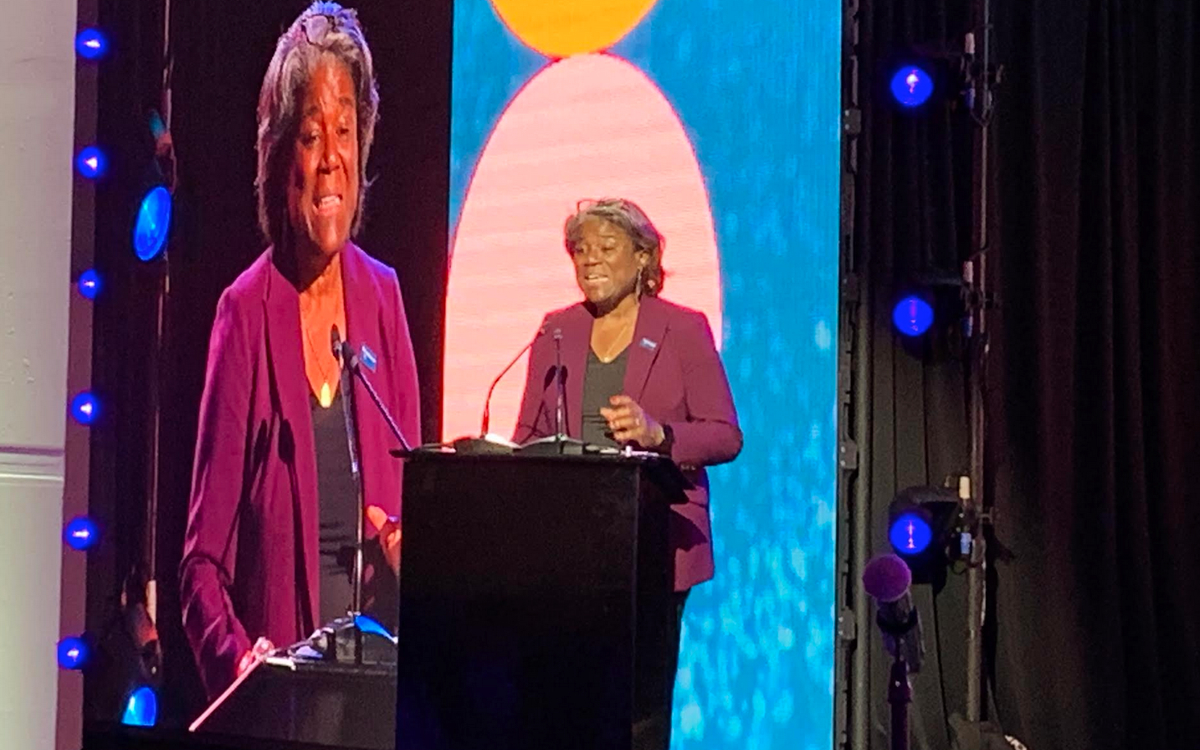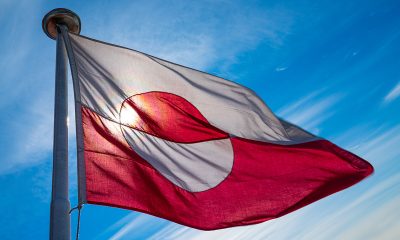United Nations
U.S. ambassador to U.N. attends Summit of the Americas in Calif.
Linda Thomas-Greenfield says LGBTQ rights remain a top priority

U.S. Ambassador to the U.N. Linda Thomas-Greenfield on Friday said LGBTQ rights remain a top priority for her and her colleagues at the United Nations.
“There’s a lot of work to be done, but it’s very much a priority for us as we deal with numerous crises across the board,” Thomas-Greenfield told the Los Angeles Blade during a telephone interview from the Summit of the Americas, which took place this week in Los Angeles.
The U.S. Senate in February 2021 confirmed Thomas-Greenfield as the next U.S. ambassador to the U.N.
The Louisiana native is a veteran American diplomat who was the U.S. Ambassador to Liberia from 2008-2012. Thomas-Greenfield was assistant secretary of state for African affairs from 2013-2017.
Thomas-Greenfield in response to the Blade’s question about the previous administration’s campaign that encouraged countries to decriminalize consensual same-sex sexual relations said “all of our embassies and our ambassadors had instructions to address issues of criminalization of the LGBTQI community.” Thomas-Greenfield also noted then-Liberian President Ellen Johnson Sirleaf refused to sign a bill that would have criminalized same-sex relationships after she “went to the president” with her concerns.
“They (Liberian officials) were very, very clear on what our position is,” said Thomas-Greenfield.
She pointed out the U.S. is a member of the LGBTI Core Group, a group of U.N. countries that have pledged to support LGBTQ rights.
Thomas-Greenfield said the U.N. General Assembly’s adoption of a free elections resolution last November that specifically includes sexual orientation and gender identity “was extraordinarily important for us.” Thomas-Greenfield also noted the U.S. Embassy in Guyana supported efforts to decriminalize cross-dressing in Guyana in accordance with a 2018 Caribbean Court of Justice ruling.
Guyanese lawmakers last August approved a bill that removed cross-dressing from the country’s Summary Jurisdiction (Offenses) Act.
“Our embassy there advocated for the removal of this language and we were successful in doing that,” said Thomas-Greenfield.
President Biden in February 2021 signed a memo that committed the U.S. to promoting LGBTQ rights abroad as part of his administration’s overall foreign policy. Thomas-Greenfield said the directive “was one of my guiding principles when I arrived in New York.”
“Having that memo in hand gave me the impetus to do those things that all of us care about anyways, but it made a difference having the president instruct us,” she said.
The Taliban regaining control of Afghanistan and Russia’s invasion of Ukraine are among the myriad crises to which Thomas-Greenfield has responded since her arrival at the U.N.
Advocacy groups continue to urge the U.S. and other Western governments to do more to help LGBTQ Afghans and other at-risk groups to leave the country. Reports from Ukraine indicate transgender people have not been able to leave the country because their gender presentation does not correspond with the gender marker on their ID documents.
“It’s so important that we are there to ensure that this community receives the protection that is afforded to them,” said Thomas-Greenfield.
Thomas-Greenfield said she and her U.N. colleagues in Geneva “are working to ensure that LGBTQI+ issues are taken into consideration in all of the work that the U.N. is doing around the world, including as it relates to refugees.”
She noted they “provide and encourage the U.N. to provide” the same human trafficking protections offered to young Ukrainian women “to the LGBTQI+ community when they’re crossing borders.” Thomas-Greenfield also acknowledged the difficulties that Trans Ukrainians who want to leave the country face.
“I’m aware of it and I know that the U.N. is aware of it and is making every attempt to address the issue,” she said. “The point I would make to these countries is when people leave their countries, they’re not racing to get documents to prove who they are or what they believe in. You race for your life.”
“What people told us is that they were lucky to get out with a backpack,” added Thomas-Greenfield. “So, we have to press these countries to stop these restrictions that require people to show any kind of documentation when they’re fleeing for their lives.”
The Summit of the Americas took place in Los Angeles from June 6-10.
Thomas-Greenfield noted she attended President Biden’s meetings with Canadian Prime Minister Justin Trudeau and Brazilian President Jair Bolsonaro. Thomas-Greenfield also met with Honduran government officials, among others.
Thomas-Greenfield on Thursday delivered the closing keynote speech at the Young Americas Summit. She noted that one of the people who she met at the event was an “extraordinary, extraordinary young man” from Colombia who works to implement the peace agreement between his government and the Revolutionary Armed Forces of Colombia that specifically acknowledges the conflict’s LGBTQ victims.
“I was just amazed at his courage, his commitment, his passion for making change and ensuring the LGBTQI community in Colombia was protected and the necessary assistance that they need,” said Thomas-Greenfield.
Thomas-Greenfield also acknowledged criticisms over the decision not to invite Cuba, Nicaragua and Venezuela to the summit.
“We heard the concerns about this, but I will tell you that civil society was invited across the board from these countries,” she said. “We think it was important that the voices of those individuals who have been abused by these countries … got amplified, if not highlighted. I think that was an important result of this.”

Congress
Mike Waltz confirmed as next UN ambassador
Trump nominated former national security advisor in May

The U.S. Senate on Sept. 19 confirmed former U.S. Rep. Mike Waltz (R-Fla.) as the next U.S. ambassador to the U.N.
The Florida Republican had been the national security advisor until President Donald Trump in May tapped him after U.S. Rep. Elise Stefanik (R-N.Y.) withdrew her nomination in order to ensure Republicans maintained their narrow majority in the U.S. House of Representatives.
Senators approved Waltz’s nomination by a 47-43 vote margin.
“Thank you President Trump and the U.S. Senate for your trust and confidence to Make the UN Great Again,” said Waltz on X.
The U.N. General Assembly is taking place this week in New York. Trump is scheduled to speak on Tuesday.
United Nations
UN Human Rights Council extends LGBTQ rights expert’s mandate
29 countries voted for resolution

The U.N. Human Rights Council on Monday extended the mandate of the United Nations’ independent LGBTQ rights expert for another three years.
The resolution passed with 29 countries (Albania, Belgium, Bolivia, Brazil, Bulgaria, Chile, Colombia, Costa Rica, Cuba, Cyprus, the Czech Republic, the Dominican Republic, France, Georgia, Germany, Iceland, Japan, Kenya, the Marshall Islands, Mexico, the Netherlands, North Macedonia, South Korea, Romania, South Africa, Spain, Switzerland, Thailand, and Vietnam) voting for it and 15 countries (Algeria, Bangladesh, Burundi, China, Cote d’Ivoire, Democratic Republic of Congo, Ethiopia, Gambia, Indonesia, Kuwait, Malawi, Maldives, Morocco, Qatar, and Sudan) voted against it.
Benin, Ghana, and Kyrgyzstan abstained.
The U.S. in February withdrew from the Human Rights Council. The Trump-Pence administration in 2018 pulled the U.S. from it. The U.S. in 2021 regained a seat on the Human Rights Council.
Graeme Reid has been the UN’s independent LGBTQ rights expert since 2023. The South African activist, among other things, previously ran Human Rights Watch’s LGBT Rights Program.
United Nations
Trump pulls Elise Stefanik’s UN ambassador nomination
Republicans have slim majority in US House of Representatives

President Donald Trump on Thursday withdrew U.S. Rep. Elise Stefanik (R-N.Y.)’s nomination to become the next U.S. ambassador to the U.N.
The Associated Press noted Trump in a Truth Social post said it was “essential to maintain every Republican seat in Congress.”
Republicans currently have a narrow 218-213 majority in the U.S. House of Representatives. Special elections to fill the seats that National Security Adviser Mike Waltz and former U.S. Rep. Matt Gaetz (R-Fla.) vacated when they joined the Trump-Vance administration and resigned respectively will take place on April 1 in Florida.
“Elise Stefanik is truly a great leader and a devoted patriot,” said House Speaker Mike Johnson (R-La.) in a statement. “Today’s selfless decision shows America what those of us who work with her already know. She is deeply devoted to her country and fully committed to see President Trump’s agenda succeed in Congress.”
“It is well known Republicans have a razor-thin House majority, and Elise’s agreement to withdraw her nomination will allow us to keep one of the toughest, most resolute members of our conference in place to help drive forward President Trump’s America First policies,” he added. “There is no doubt she would have served with distinction as our ambassador to the United Nations, but we are grateful for her willingness to sacrifice that position and remain in Congress to help us save the country.”
Stefanik, 40, has represented New York’s 21st Congressional District since 2015. She later became chair of the House Republican Conference.
Stefanik in 2019 voted for the Equality Act, but she opposed it in 2021. Stefanik in 2022 is among the dozens of Republicans who voted for the Respect for Marriage Act that then-President Joe Biden signed.
Stefanik, among other things, has also been outspoken against antisemitism on college campuses.
Trump has not said who he will nominate to become U.N. ambassador. Johnson in his statement said he will “invite her to return to the leadership table” of the House Republican Conference “immediately.”


















